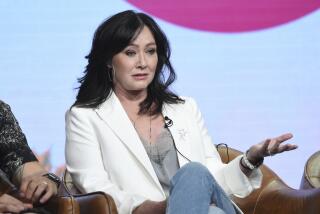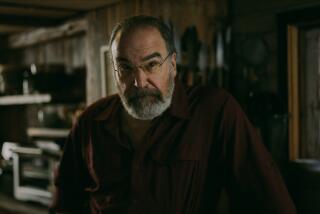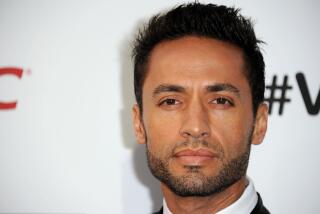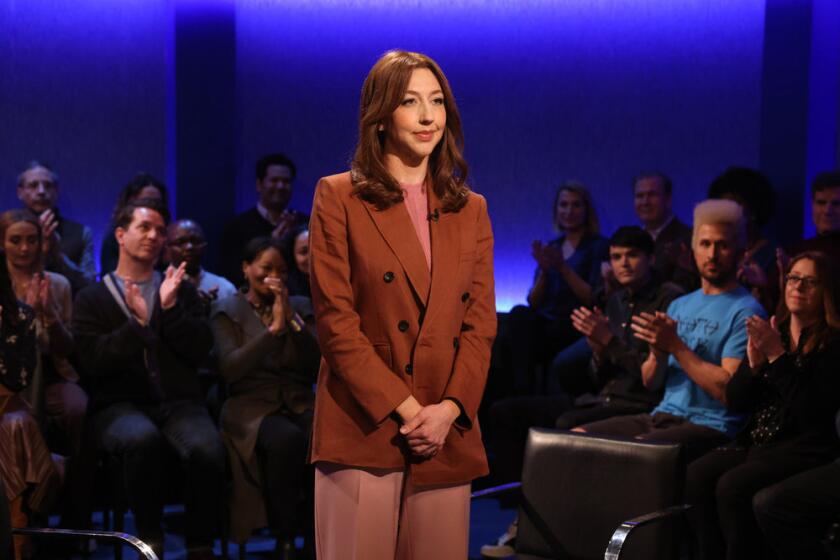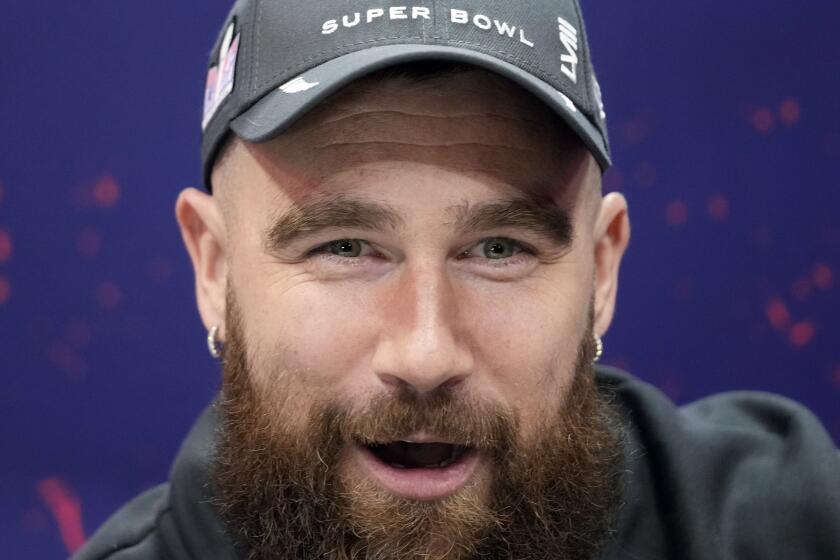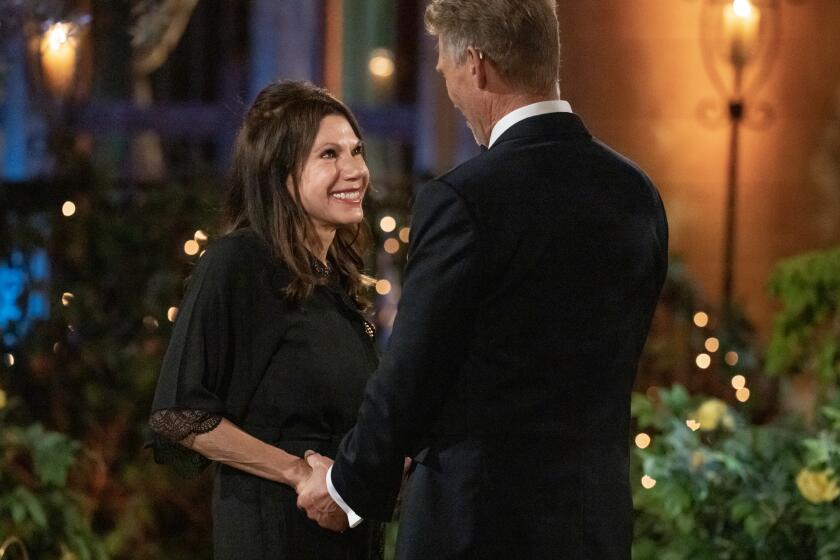Q&A: Nicole ‘Little’ Lencioni on Showtime’s ‘Time of Death’
Death is a common theme on television. We watch people get shot, stabbed, strangled, blown up and more with numbing regularity on a variety of fictional shows.
Real death, however, is another thing. It remains a taboo. We shy from it, we fear it, we don’t talk about it. This, despite the fact that we will all face it.
Our fragile mortality, however, comes into focus on the small screen on Friday when Showtime premieres an unsettling, raw and touching documentary series called “Time of Death.”
Each episode documents the real-life death of a new subject, and chronicles in unflinching detail the way they and their families cope. Sometimes we watch as a subject takes a final breath, the death rattle all too visceral — a reminder of things we have lived through with those we have lost, or will live through one day.
One family’s story is woven throughout all six episodes of the show. The dying woman is Maria Lencioni, a single mother who received a diagnosis of stage four breast cancer. She has three children: Nicole (who’s nickname is “Little”), 26, Julia, 15, and Andrew, 16.
Little often wields the camera throughout the family’s ordeal, getting them to open up in ways they wouldn’t otherwise. The result is compelling and harrowing — made all the more so since we know how the story ends.
Maria passed away at home in April and Little has been doing her best to be a role model for her younger siblings while working on her writing and music in her Santa Cruz home. The Times got on the phone with her recently to talk about her experience filming the show and what her life is like now that her mother is gone.
Q: Why did you and your family decide to be involved with “Time of Death”? Was the decision a difficult one?
A: The most influential thing that helped us decide to do this was that when I had the camera in my hands and was talking to my mom, I saw her open up in ways I had never seen before. It kind of gave her permission to talk about things openly and honestly for the first time, and same for my brother and sister. It had such a positive effect, plus the positive intention of wanting to help other people, and be the example that we never had. It was kind of a natural and easy thing to move forward with.
PHOTOS: Behind the scenes of movies and TV
Q: Once the process began did you feel like you had to filter yourself around the camera?
A: I’m not a person with much filter in any area of my life. I’m not even conscious of those things. I think that if it’s in real life then that’s God’s plan and there’s nothing wrong in God’s world, so there’s nothing that should be hidden or filtered.
Q: What do you hope to see happen as a result of this show, and of sharing your experience?
A: I hope that it opens up the dialogue about death and grief and all of that. I talk about this in the show, but we’re more scared of what we don’t know — the boogie man in the dark. When the lights are on we get it. And I think if the lights were on, on a subject matter like death we wouldn’t be so scared, and we wouldn’t have to face it alone, instead there would be some community around it. On a personal level, I hope this serves to remind people that this is raw, this is real, this is unscripted, this is documenting. This is taking a picture — this is really a clear snapshot. I think that’s what documentaries should do — just document. They shouldn’t influence.
Q: How were the cameras handled throughout the experience?
A: I carried it a lot. My mom and brother and sister talked more openly if it was me as opposed to the producer working with us. So I was doing a lot. It was there unless someone said, “No, not now.” But there wasn’t a whole lot of stuff going on that you were like, “Oh, hold on, not this subject matter.” You’re talking about death, there’s nothing polite about anything else.
FALL TV 2013: Watch the trailers
Q: How often was your family being documented?
A: It really depended on what my mom was going through. She was doing a bunch of rounds of chemo and then there were scheduled CAT scan results and then a court hearing. If the calendar looked like that then maybe they would come up for a week and a half, but more often they just popped into town for three or four days. It was strange, it never was invasive, it never was surprising and we never felt abandoned after. Maybe I was too distracted by grief to pay attention to any of that. It was very fluid. Alexandra, our producer, was incredible. She had a really keen ability to read people, not just on camera, but in a room. She could take the temperature — if I was feeling uncomfortable she would say, “Little, do you want to slow down? Do you want us to go?” My mom was like, “No, you should stay,” more than anything else.
Q: What did you learn about your mom during this journey? And what did you learn about yourself?
A: I’m working on writing a book, a memoir — it’s been a longtime goal of mine and my memory is really spotty from when I was younger. So being able to sit my mom down and ask her, “Where did we live, or did you have a job? You went to college for two years, oh wow.” And that was so interesting. The other thing I learned was how to deal with the children. I learned how much patience my mom had, because of how much I needed to deal with them. And when she wasn’t as strong in ways that I always thought she was ... and I learned that she was stronger in ways that I hadn’t known [Little begins to cry]. Then what happens to people when we lose someone — we think about how wrong our perception was, because everything changes when someone’s gone. And instead of letting that tear me down, what I’ve learned to do with that is to look and say, “Wow, OK, so my perception was off. I was seeing this through a skewed lens.” Now that I’ve seen that, let me learn to adjust it so I don’t see other people that way. So I don’t lose another person and have to be wrong again.
PHOTOS: Cable versus broadcast ratings
Q: How has life changed since your mom has passed?
A: It feels like I’m doing what I said I wanted to do. It feels like I’m doing the right thing.... The biggest thing I said I wanted to do after my mom got diagnosed was, I prayed that I wouldn’t get hard from this whole experience. And for the last five years I just prayed that I would remain as soft as I can because before my mom got sick I was really tough and my edges had kind of softened a little. So when this happened I didn’t want my heart to get closed and I think that has been my biggest success and accomplishment: That throughout it, and afterward, I was able to keep my heart open and not feel wronged that I lost my mom.
Q: You’re a musician. Has this experience affected your music?
A: I just poured all of this into my new music projects. I’m in a band called the Switched, it’s just me and a woman named Abby Frenes. I’m really proud of it and I wish my mom could’ve heard this. We just finished recording our first single — “Mercury” — which will be on iTunes around the first week of November. And I’m still working on the book I started when my mom was still alive. Before my mom got sick, music and writing were my passion. I wanted to show my mom as much as possible while I still had her, so I was able to get a third of it out there, she told me to keep writing.
Q: Is writing music therapeutic?
A: Yes, it’s so emotional and hands-on. It’s therapeutic in a way that’s creative, which is exactly what my mom wanted to do with her death in the documentary. It’s this beautiful release, it’s honest but it’s also creating something out of nothing that is going to be there forever.
Q: Have you seen the show? How did it feel to watch it?
A: I saw the first episode yesterday. Man, it was a full-course meal. I laughed. I cried, I rolled my eyes at myself. It broke my heart, and at the end it made me smile. It was good to see my mom, I miss her.
Q: Do you think you’ll be able to watch it through to the end?
A: Yeah, I think so. If I can live it, I think I can watch it.
ALSO:
NBC greenlights comedy from Tina Fey
‘How I Met Your Mother’ spinoff: Good idea or bad idea?
Witches are one was to ‘safely’ present strong female characters
More to Read
The complete guide to home viewing
Get Screen Gab for everything about the TV shows and streaming movies everyone’s talking about.
You may occasionally receive promotional content from the Los Angeles Times.
